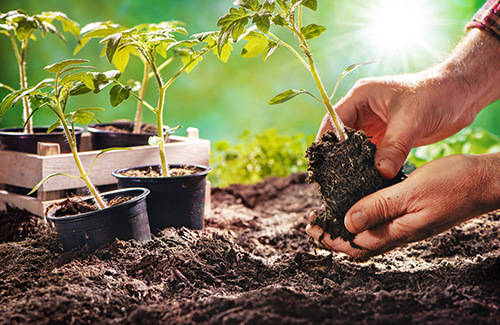Gardening in June: Tasks for a Thriving Garden
Jun 21, 2024

June is a fantastic month for gardeners. While much of the early season planting is already done, there’s still plenty to do to ensure your garden flourishes with fresh produce, fragrant herbs, and beautiful blooms. In this blog, we will cover some important tasks to keep your garden thriving through June.
Remove deadhead blooms
Remove spent blooms from annual flowers to encourage more blooming and extend their growing season. This simple task can keep your garden vibrant and full of color.
Trim bulbs
After spring bulbs have finished flowering and the foliage has turned completely brown, trim the foliage. This tidies up your garden beds and makes room for summer flowers.
Prune flowering shrubs
Once spring-flowering shrubs have finished blooming, prune them to maintain their shape and promote healthy growth.
Plant warm-season crops
June is perfect for planting warm-season crops like corn, pumpkins, beans, squash, and cucumbers. These plants thrive in warm soil and long summer days.
Adjust watering
As spring rains diminish and summer heat increases, adjust your watering schedule. Soaker hoses are ideal for providing consistent moisture to beds and gardens. Water lawns deeply but less frequently to encourage strong root development.
Deepen mulch
Add more mulch to gardens and flowerbeds to conserve water and reduce weed growth.
Divide perennials
If your perennials are getting too large or need more space, June is an ideal time to divide and transplant them. It’s also a great time to introduce new perennials to your garden.
Thin seedlings
Thin out crowded seedlings to ensure they have enough space to grow robustly. Thinning early fruits on trees can also encourage larger, healthier produce.
Keep weeding
Weeding is a continuous task. Stay on top of it in June to give your crops a strong start and achieve better results in the fall.
Stake plants
As your plants grow taller, stake thin or floppy ones to prevent them from tipping over and breaking. June is also the best time to start training vines and climbing plants.
Harvest spring produce
Cool-season fruits and vegetables such as strawberries, radishes, lettuce, and spinach are nearly finished growing by June. Make the most of one last harvest before summer fully sets in.
Watch for pests
June brings out pests like slugs, aphids, and various fungi and diseases. Keep a close watch on your garden and address any problems early to prevent them from escalating.
By following these tips and tasks, your June garden will be well on its way to thriving with lush plants and a bountiful harvest. From seeds and mulch to tools and expert advice, Co-op has everything you need to make your garden a success. Happy gardening!
Find your nearest Co-op location here. For more content like this, check out the latest issue of The Cooperator.
Remove deadhead blooms
Remove spent blooms from annual flowers to encourage more blooming and extend their growing season. This simple task can keep your garden vibrant and full of color.
Trim bulbs
After spring bulbs have finished flowering and the foliage has turned completely brown, trim the foliage. This tidies up your garden beds and makes room for summer flowers.
Prune flowering shrubs
Once spring-flowering shrubs have finished blooming, prune them to maintain their shape and promote healthy growth.
Plant warm-season crops
June is perfect for planting warm-season crops like corn, pumpkins, beans, squash, and cucumbers. These plants thrive in warm soil and long summer days.
Adjust watering
As spring rains diminish and summer heat increases, adjust your watering schedule. Soaker hoses are ideal for providing consistent moisture to beds and gardens. Water lawns deeply but less frequently to encourage strong root development.
Deepen mulch
Add more mulch to gardens and flowerbeds to conserve water and reduce weed growth.
Divide perennials
If your perennials are getting too large or need more space, June is an ideal time to divide and transplant them. It’s also a great time to introduce new perennials to your garden.
Thin seedlings
Thin out crowded seedlings to ensure they have enough space to grow robustly. Thinning early fruits on trees can also encourage larger, healthier produce.
Keep weeding
Weeding is a continuous task. Stay on top of it in June to give your crops a strong start and achieve better results in the fall.
Stake plants
As your plants grow taller, stake thin or floppy ones to prevent them from tipping over and breaking. June is also the best time to start training vines and climbing plants.
Harvest spring produce
Cool-season fruits and vegetables such as strawberries, radishes, lettuce, and spinach are nearly finished growing by June. Make the most of one last harvest before summer fully sets in.
Watch for pests
June brings out pests like slugs, aphids, and various fungi and diseases. Keep a close watch on your garden and address any problems early to prevent them from escalating.
By following these tips and tasks, your June garden will be well on its way to thriving with lush plants and a bountiful harvest. From seeds and mulch to tools and expert advice, Co-op has everything you need to make your garden a success. Happy gardening!
Find your nearest Co-op location here. For more content like this, check out the latest issue of The Cooperator.